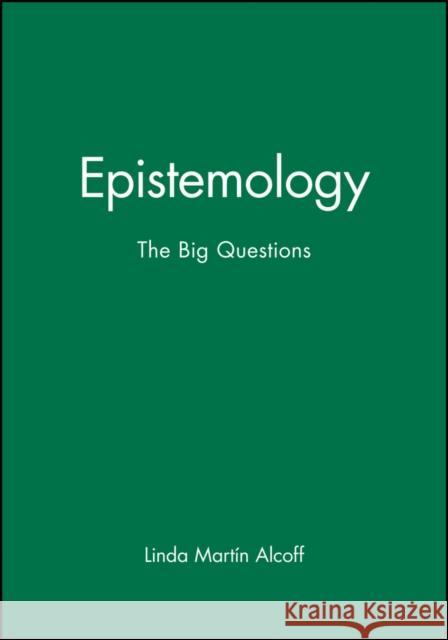Epistemology: The Big Questions » książka



Epistemology: The Big Questions
ISBN-13: 9780631205807 / Angielski / Miękka / 1991 / 464 str.
Epistemology: The Big Questions
ISBN-13: 9780631205807 / Angielski / Miękka / 1991 / 464 str.
(netto: 262,20 VAT: 5%)
Najniższa cena z 30 dni: 274,74
ok. 30 dni roboczych.
Darmowa dostawa!
As well as including the classic papers from the history of epistemology, this distinctive, wide-ranging anthology provides essential coverage of key contemporary challenges to that tradition.
"Professor Alcoff has assembled a first–rate new collection in epistemology. Its most obvious virtue is that it brings together classic papers in analytic epistemology with recent work in feminist epistemology, allowing comparison and cross–fertilization of work which, for too many, has been treated as if falling into altogether distinct areas. In addition, this collection is sensibly organized more thorough than most, and provided with clear and helpful introductions to each section. It will be valuable resource for both undergraduate and graduate courses."
Mark Norris, Georgetown University
"Linda Alcoff presents and organizes central debates in epistemology in a way that both illuminates and bridges diverse contemporary approaches. Her provocative juxtapositions can help to reinvigorate traditional discussions and help set new directions." Naomi Scheman, Gothenburg University
Preface.
Acknowledgments.
Part I: What is Knowledge?:.
1. Introduction.
2. Meditations: Rene Descartes.
3. On Certainty: Ludwig Wittgenstein.
4. The Right to be Sure: A. J. Ayer.
5. Epistemology′s End: Catherine Elgin.
Further Reading.
Part II: How Are Beliefs Justified?:.
6. Introduction.
7. Internalism and Externalism in Epistemology: William P. Alston.
8. The General Conditions of Knowledge: Justification: Carl Ginet.
9. What is Justified Belief?: Alvin Goldman.
10. Contextualism and Knowledge Attributions: Keith DeRose.
11. Taking Subjectivity into Account: Lorraine Code.
12. The Practices of Justification: Alessandra Tanesini.
Further Reading.
Part III: What is the Structure of Knowledge?:.
13. Introduction.
14. The Myth of the Given: Roderick Chisholm.
15. The Raft and the Pyramid: Ernest Sosa.
16. The Elements of Coherentism: Laurence BonJour.
17. The Hermeneutic Code: Hans–Georg Gadamer. Further Reading.
Part IV: What is Naturalized Epistemology?:.
18. Introduction.
19. Epistemology Naturalized: W. V. O. Quine.
20. What is ′Naturalized Epistemology? Jaegwon Kim.
21. Putting Naturalized Epistemology to Work: Phyllis Rooney. Further Reading.
Part V: What is Truth?:.
22. Introduction.
23. The Minimal Theory: Paul Horwich.
24. Language, Truth and Reason: Ian Hacking.
25. Pragmatism, Relativism, Irrationalism: Richard Rorty. Further Reading.
Part VI: What if We Don′t Know Anything At All?:.
26. Introduction.
27. Cartesian Scepticism and Inference to the Best Explanation: Jonathan Vogel.
28. Skepticism and the Possibility of Knowledge: Barry Stroud.
29. Othello′s Doubt/Desdemona′s Death: The Engendering of Scepticism: Naomi Scheman.
Further Reading.
Part VII: How is Epistemology Political?.
30. Introduction.
31. The ′Maleness′ of Reason: Genevieve Lloyd.
32. Alternative Epistemologies: Charles W. Mills.
33. Idols of the Cave: Mary Tiles and Jim Tiles.
Index.
Linda Martin Alcoff is Associate Professor of Philosophy at Syracuse University. She is the author of Real Knowing: New Versions of the Coherence Theory of Knowledge (1996) and co–editor of Feminist Epistemologies (1993) which was named a Critic′s Choice Book for 1993 by the American Educational Studies Association.
As well as including the classic papers from the history of epistemology, this distinctive, wide–ranging anthology provides essential coverage of key contemporary challenges to that tradition.
Alongside debates over internalism and externalism, foundationalism, and coherentism, and whether epistemology can or should be naturalized, are included essays on the subject of knowledge, the political implications of foundationalism, and the ′maleness′ of reason. Sections on knowledge, justification, truth, skepticism, the structure of knowledge, and the politics of knowledge are each preceded with brief, accessible introductions that help frame the debates and bridge the diversity of approaches.
Students of epistemology will be able to learn about and assess a wider range of epistemological issues than any other existing anthology can currently provide. Organized specifically with courses in mind, Epistemology: The Big Questions is accessible to upper–level undergraduates and graduate students.
1997-2026 DolnySlask.com Agencja Internetowa
KrainaKsiazek.PL - Księgarnia Internetowa









